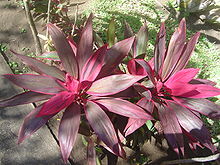Cordyline
| Cordyline | |
|---|---|

| |
| Cordyline fruticosa | |
| Scientific classification | |
| Kingdom: | Plantae |
| Clade: | Tracheophytes |
| Clade: | Angiosperms |
| Clade: | Monocots |
| Order: | Asparagales |
| Family: | Asparagaceae |
| Subfamily: | Lomandroideae |
| Genus: | Cordyline Comm. ex R.Br.[1] |
| Species | |
|
See text | |
| Synonyms | |
| |
Cordyline is a genus of about 24 species of woody monocotyledonous flowering plants in family Asparagaceae, subfamily Lomandroideae. The subfamily has previously been treated as a separate family Laxmanniaceae,[2] or Lomandraceae. Other authors have placed the genus in the Agavaceae (now Agavoideae). Cordyline is native to the western Pacific Ocean region, from New Zealand, eastern Australia, southeastern Asia and Polynesia, with one species found in southeastern South America.
The name Cordyline comes from the Greek word kordyle, meaning "club," a reference to the enlarged underground stems or rhizomes.[3]
Species
As of March 2015[update], the World Checklist of Selected Plant Families accepted 24 species:[4]
- Cordyline angustissima K.Schum. – New Guinea
- Cordyline australis (G.Forst.) Endl. (Cabbage Tree) – New Zealand
- Cordyline banksii Hook.f. (syn. C. diffusa Colenso.) – New Zealand
- Cordyline cannifolia R.Br. – Australia: N.E. Northern Territory, N.E. Queensland
- Cordyline casanovae Linden ex André – Vanuatu
- Cordyline congesta (Sweet) Steud. (syn. C. dracaenoides Kunth) – Australia: S.E. Queensland to N.E. New South Wales
- Cordyline diffusa Colenso. (syn. C. banksii Hook.f.) – New Zealand
- Cordyline forbesii Rendle – Papua New Guinea
- Cordyline fruticosa (L.) A.Chev. – Papuasia to W. Pacific
- Cordyline indivisa (G.Forst.) Endl. (mountain cabbage tree) – New Zealand (syn. Cordyline hectori, Cordyline hookeri)
- Cordyline lateralis Lauterb. – New Guinea
- Cordyline ledermannii K.Krause – New Guinea
- Cordyline manners-suttoniae F.Muell. – Australia: N.E. Queensland
- Cordyline mauritiana (Lam.) J.F.Macbr. – Mascarenes
- Cordyline minutiflora Ridl. – New Guinea
- Cordyline murchisoniae F.Muell. (syn. C. haageana K.Koch) – Australia: E. Queensland
- Cordyline neocaledonica (Baker) B.D.Jacks. – New Caledonia
- Cordyline obtecta (Graham) Baker – Norfolk Island, N. New Zealand North Island
- Cordyline petiolaris (Domin) Pedley – Australia: S.E. Queensland to N.E. New South Wales
- Cordyline pumilio Hook.f. – New Zealand North Island
- Cordyline racemosa Ridl. – New Guinea
- Cordyline rubra Otto & A.Dietr. – Australia: S.E. Queensland to N.E. New South Wales
- Cordyline schlechteri Lauterb. – New Guinea
- Cordyline sellowiana Kunth – Bolivia to Brazil and N. Argentina
- Cordyline stricta (Sims) Endl. – Australia: S.E. Queensland to N.E. New South Wales
Formerly placed here
- Dracaena aletriformis (Haw.) Bos (as C. rumphii Hook.)
- Dracaena elliptica Thunb. & Dalm. (as C. maculata (Roxb.) Planch. and C. sieboldii Planch.)
- Dracaena fragrans (L.) Ker Gawl. (as C. fragrans (L.) Planch.)[5]
Cultivation and uses
Members of the group are often grown as ornamental plants - notably C. australis and C. fruticosa. Many species have been used as a foodstuff and medicine, for additional details on these and other uses see the article on C. australis. The rhizome was roasted in an hāngi (earth oven) by Māori to extract sugar.[6]
In the highlands of Papua New Guinea. leaves of Cordyline and other plants are tied to sticks to mark taboo areas where pandanus language must be spoken during karuka harvest.[7]
References
- ^ a b "Genus: Cordyline Comm. ex R. Br". Germplasm Resources Information Network. United States Department of Agriculture. 2010-01-19. Archived from the original on 2012-09-21. Retrieved 2011-02-08.
- ^ Chase, M.W.; Reveal, J.L. & Fay, M.F. (2009), "A subfamilial classification for the expanded asparagalean families Amaryllidaceae, Asparagaceae and Xanthorrhoeaceae", Botanical Journal of the Linnean Society, 161 (2): 132–136, doi:10.1111/j.1095-8339.2009.00999.x
- ^ Bok-mun Ho (2006). "Cordyline obtecta". Australian National Botanic Gardens. Retrieved 2008-04-12.
- ^ "Search for Cordyline". World Checklist of Selected Plant Families. Royal Botanic Gardens, Kew. Retrieved 2015-03-29.
- ^ "GRIN Species Records of Cordyline". Germplasm Resources Information Network. United States Department of Agriculture. Archived from the original on 2009-01-20. Retrieved 2011-02-08.
- ^ Morton, Elsie K. (1964). Crusoes of Sunday Island. Wellington: A.H. & A.W. Reed. p. 53.
- ^ French, Bruce R. (1982). Growing food in the Southern Highlands Province of Papua New Guinea (PDF). AFTSEMU (Agricultural Field Trials, Surveys, Evaluation and Monitoring Unit) of the World Bank funded project in the Southern Highlands of Papua New Guinea. pp. 64–71. Retrieved 20 September 2018.
![]() Media related to Cordyline at Wikimedia Commons
Media related to Cordyline at Wikimedia Commons
